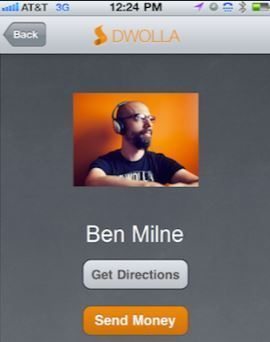
As my readers will know, I regularly interview innovators of start-ups and banks of how they see the world. These interviews constitute a third of the ValueWeb and Digital Bank books. In the interests of maintaining these case studies, as I find them interesting, I recently met Ben Milne, Founder and CEO of Dwolla.
In case you're unfamiliar with Dwolla, here's an overview from The Verge:
When it comes to radically altering the fabric of digital payments, there is no startup more interesting than Dwolla. The Iowa-based company has built its own alternative to the credit card networks and Automated Clearing House (ACH), the decades-old infrastructure which powers everything from bank transfers to cutting-edge payment companies like Square. Creating its own network from scratch has given Dwolla two powerful advantages over its competitors. First, it can avoid the hefty interchange fees levied by the credit card companies. And second, it can offer instantaneous transfers, avoiding the sometimes multi-day waiting periods associated with ACH.
Now you've got that, here's Ben's take on the world.
How did you get involved in starting up Dwolla? What were you doing before?
At one point, I started researching how to move money between banks electronically, which is what cards do. I started working on Dwolla in around 2008. It took a few years after that to get the company into the market and figure out how to do it.
I was building a manufacturing company before diving into Dwolla.
How has Dwolla evolved to the stage it is today?
We started with a consumer product and for a few years we were fortunate to have growth that we just needed to keep up with. Once that calmed down we started looking at business lines and then launched two: a business line to sell directly to banks and a business line to sell our platform as a white label ACH suite of APIs.
The bank product was great in theory and the idea of it was well received. In practice, the tech worked well but getting banks online quickly didn’t work. We decided to cut the direct bank product line and focus on the direct to business product.
The white label product is good in theory and in practice. We’ve continued to release new features and focus more and more on this product. A good way to think about is that it’s an API to access the US banking system. Since we launched it late last year we’ve continued to iterate and introduce new support. We started with a new developer experience and just recently introduced a new Dashboard and Admin.
I hear you’re working with the ACH in the USA. What is Dwolla doing?
We make it easy to facilitate ACH transfer through our APIs. There’s a multitude of things that makes ACH hard for new companies to use, and difficult for big companies to automate.
ACH can be better with or without a faster payment system up and running. Real-time notifications for transactions, fraud monitoring, or even the inclusion of a way to instantly authorize bank accounts. Dwolla.js for example, is another part of our white label services that makes it easy to instantly authorize bank accounts in the US.
ACH as a standalone system isn’t ready for a lot of technology companies to use and there isn’t a standard API for using it. What we’ve found working with a number of our customers is that they just want an easy API that moves money and saves them time.
The amazing thing about ACH is that the actual costs are fairly similar to SMS costs. It’s just not super expensive. The difficult thing is that messages are significantly more complicated to send and track. Developers and businesses really need a layer on top of ACH to make it usable for their business.
How does the new Dashboard and Admin help achieve that?
The themes here are time savings and business insights. Our initial launch partners built some really beautiful solutions and when we thought “How can we save developers more time?”, the dashboard was the obvious answer..
Dwolla was elected to the steering committee for the Federal Reserve's Faster Payments. What does that say about Dwolla and its own faster payments tech, FiSync?
We’ve spent years thinking about faster payments and we even developed our own faster payment system in FiSync. I think that the deeply entrenched parties in the payment world realize, truly, that Dwolla has done some really unique things.
We’ve been fortunate that the Fed has brought us in as a part of the conversation rather than cast aside as a small business. We’re a tiny company in this arena but if our inclusion says anything it says that we’re pretty damn good at payments.
So Dwolla isn’t just about cheap bank transfers? Is the DnA an attempt at delivering additional services outside of payments?
When people hear “Dwolla,” many immediately think: cheap transactions. While we pride ourselves in delivering an affordable ACH transfer solution at a predictable cost, most of our clients come to us for the downstream efficiencies and immediate capabilities we can provide them—things you can’t find at a bank or credit union.
For example, one of our clients, a marketplace that uses the API to payout suppliers, uses Dwolla’s real-time webhooks to create custom email notifications for end-users, decreasing their cashout related support tickets by 80% and time to resolution by 50%. Another client saw 23% reduction in reversals and a corresponding 90% reduction in labor associated with manually processing those reversals by integrating our bank verification product and simplifying the on-boarding flow for their end-users.
In a way, we’ve always been dedicated to creating new capabilities, while streamlining or simplifying the operations associated with payments. DnA is merely an extension of this philosophy.
What does Payments-as-a-Software movement say about the payment ecosystem in the United States?
Modern companies, which are driving new customer experiences, profit margins, and business models, are looking for modern financial capabilities and efficiencies. But modern doesn’t always mean new. Granted, Dwolla is a big proponent for an improved real-time payment system in the US tomorrow, but technology can help old systems interoperate seamlessly with new ideas today. We believe Dwolla’s APIs, the DnA, and our wide range of customers and use cases prove that.
How do you see payments in ten years from now?
Faster and safer. There’s a proliferation of faster payment projects around the world and cryptography has never been a more important part of the conversation.
When you’re able to mash the world’s critical financial infrastructures with some of the brightest minds in security and technology, something really cool is bound to happen.
I can’t point to specifics but I’d bet on the faster and safer trend. The way things are accomplished in real-time because of the cheap availability of bandwidth and storage is going to compress a lot of costs in the system to the point where they’re marginally zero.
The payments industry has generated a lot of revenues based on upcharging for costs where there is a required, fixed, and emotionally predictable cost. When you remove that, because the costs are evaporating, and you start thinking about what features are needed—it changes the game.
And what are Dwolla’s immediate plans for the future?
Make ACH transfers easier for developers and working with our partners to bring great products to market.
About Ben Milne
Ben Milne is the founder and CEO of Dwolla, a payments startup building the ideal way to move money. Under Ben, the Des Moines-based company has raised over $32 million from investors, like Andreessen Horowitz and Union Square Ventures, and has been recognized by Fast Company as one of the world’s “50 Most Innovative Companies of 2014”.
Ben has been named as one of Forbes’ “Disruptors of the Year” and has appeared on Inc. Magazine’s in its annual 30 under 30 collection, Bloomberg TV, and The TODAY Show. In 2013, he was recognized for his work by MIT Technology Review’s in its annual "Innovators Under 35" list.
Chris M Skinner
Chris Skinner is best known as an independent commentator on the financial markets through his blog, TheFinanser.com, as author of the bestselling book Digital Bank, and Chair of the European networking forum the Financial Services Club. He has been voted one of the most influential people in banking by The Financial Brand (as well as one of the best blogs), a FinTech Titan (Next Bank), one of the Fintech Leaders you need to follow (City AM, Deluxe and Jax Finance), as well as one of the Top 40 most influential people in financial technology by the Wall Street Journal's Financial News. To learn more click here...


